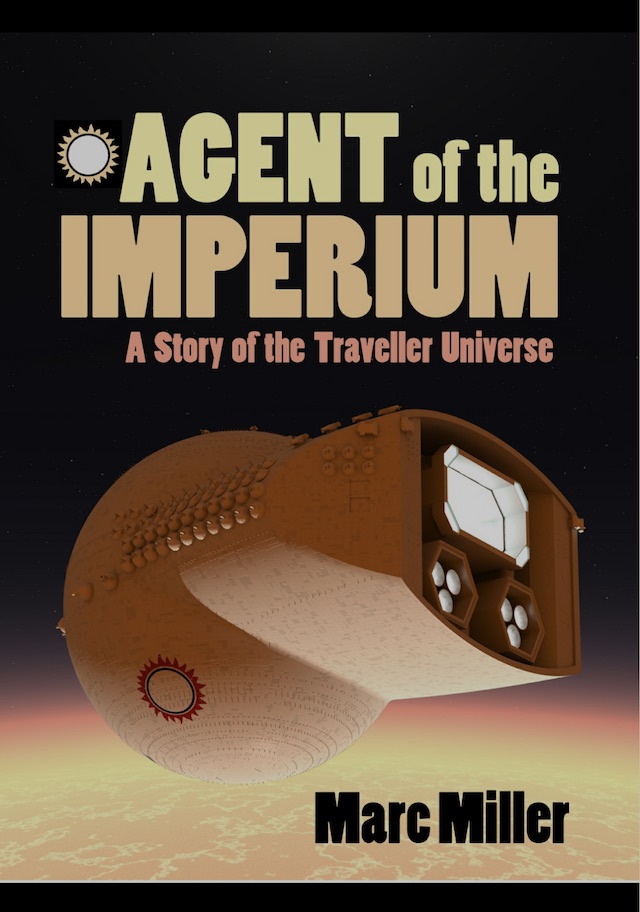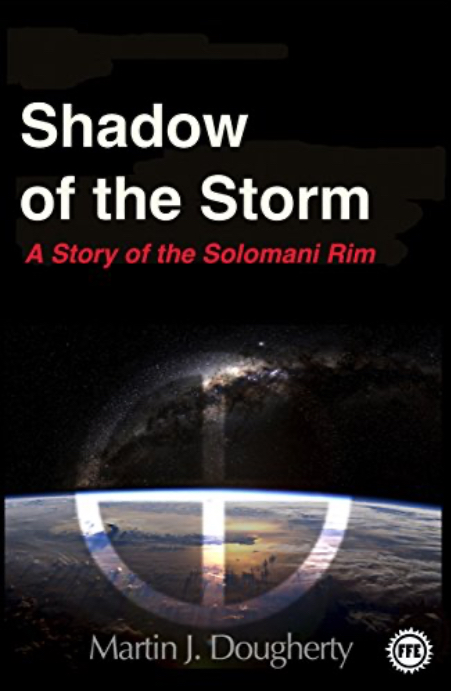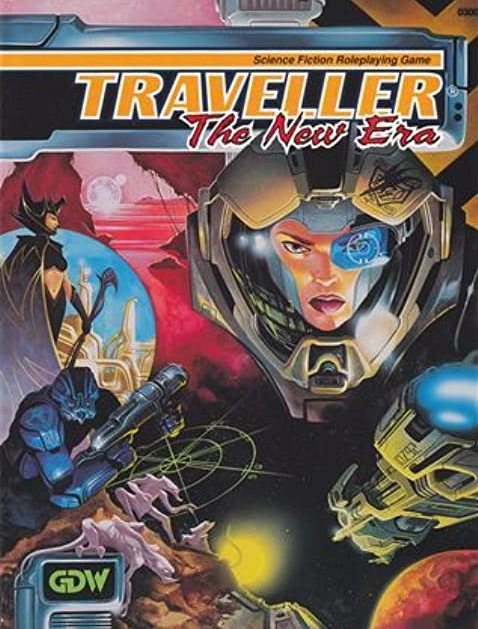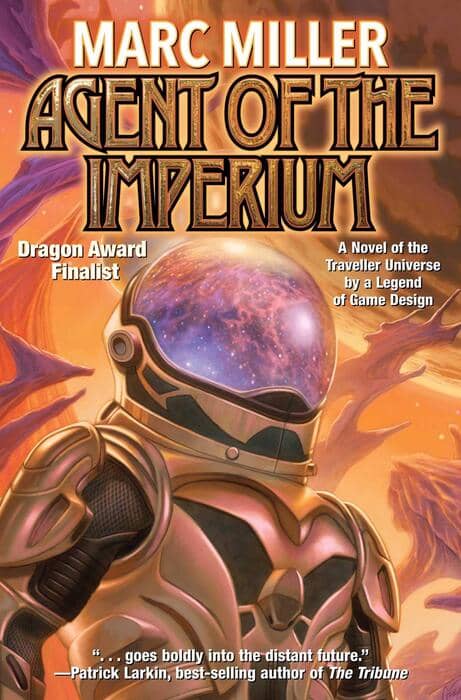Traveling the Imperium: Agent of the Imperium by Marc Miller
Agent of the Imperium (Baen Books, November 3, 2020). Cover by Alan Pollack
For having been created and played since 1977, the Traveller roleplaying game (RPG) has very little in the way of official fiction. Nothing like the Dragonlance or Drizzt series for Dungeons & Dragons or the Warhammer 40,000 line of novels. Those series have spent decades fleshing out stories and setting, acted as entry points into their respective RPGs, or stood alone for those not interested in the gaming stuff.
Traveller, on the other hand, with its rich setting and incredible scope has only seen a few (compared to the other cited series) official fiction releases. A few novels in the 1990s supporting the Traveller: New Era edition, one supporting the Marc Miller’s Traveller (the fourth edition), and few others (for example, Fate of the Kinunir and Shadow of the Storm) were published. Recently, Mongoose Publishing published as series of Traveller short stories, mostly set in the Trojan Reach that they mined and developed so excellently in the Pirates of Drinax campaign.
Perhaps the relative lack of fiction (again, compared to the hundreds of novels in the D&D and Warhammer settings) is because so many excellent science fiction novels already exist and function as surrogates for Traveller fiction. Though Traveller’s setting is unique to that RPG, it is a universe that has its roots in the science fiction of the 60s and early 70s.

One of the short stories in the Mongoose Publishing line of Traveller fiction.
So when Marc Miller — creator of Traveller — published Agent of the Imperium, many folks took notice and paid attention. Originally published in 2015 (and nominated for a Dragon Award in 2016), Baen Books has just released a printed, expanded version.

The original cover of Agent of the Imperium
The novel follows the story of Jonathan Bland, the titular agent. Bland was a capable bureaucrat in an obscure agency, Quarantine, in the early centuries of the Third Imperium, the human-dominated interstellar empire that serves as the primary backdrop for the RPG. Bland is diagnosed with a fatal, incurable disease and is given an opportunity to serve the Imperium in a unique way: have his consciousness transferred to transportable wafers. The process, though, means those people die and exist only on these wafers when called into action. Even then, when these wafers are installed into a person, the wafer’s personality becomes dominate for 30 days.
The Imperium designated five such people to take this on and serve at the behest of the Imperium to deal with situations. The interstellar ships have these five (Admiral, Warlord, Negotiator, Advisor, and Decider) available for a crisis — in essence, multiple copies of each person that can be activated for a fixed time period in a crisis. Bland is the Decider. The agents operate under Imperial Edict 97:
“It requires assistance,” he hesitated and restated, “unlimited assistance, to the holders of specific documents, written, oral, or electronic, without regard to rank, privilege, station, protocol, or security. Holders are the equivalent of the Emperor himself.”
The novel opens with Bland waking in a host (the living person the consciousness from the wafer overtakes) to deal with such an existential crisis. The time is nearly 400 years after he died. The crisis is that a parasite has made the leap to humans and is undermining a planet’s civilization. If it gets off planet and to other systems, the results could be catastrophic. While travel between planetary systems is not instantaneous (in the Traveller universe jumps into hyperspace between planets takes a week — the technology advances improve the distance jumped but not the time spent in jump), Bland recognizes the threat and decides. We learn quickly what being the Decider is: he makes the decision that others cannot, and he can do this because he is, in effect, temporary. Bland orders the sterilization of the planet by orbital bombardment.
Rule 1. You speak with the voice of the Emperor. Brook no resistance.
Rule 2. Millions of lives depend on your actions; you may need to spend some of them in the process.
Rule 3. You act through your team; build it (quickly) by whatever means available.
Rule 4. Your team is your greatest asset: use them; depend on them.
Rule 5. You hold the ability to punish and reward; do both.
Rule 6. Right action requires intelligence. (revised addition)
The rules Bland, as an Agent of the Imperium, operates by
The novel’s structure jumps around between times and places, as befits a person confined to a piece of technology and only being pulled out every so often. While the novel could have comprised a series of short stories of the Agent doing his thing, it does not. Over the first third of the book, we see the Agent in action dealing with various crises — and not always resulting to mass genocide and orbital bombardments. We also get the background history of Bland, including his finding out that the grave he had prepared for himself was not done properly. He abuses his power to exact vengeance on the person whom he had paid, along with punishing his family. It’s a petty (in the grand scheme of things) act, but one that highlights Bland’s dominating characteristic: Do what you say you will do.

When Bland wakes up in a new host, he receives various reactions — from the genuinely receptive to the help to the person opposed to his being activated. Bland finds the qualified people who can help him and ensures those who are not able to carry out their duties are removed from the picture. Importantly, Bland recognizes that, in some ways, he has it easy. He can sterilize a planet or take other extreme measures, and then he is gone. Meanwhile, those who carried out his orders remain — some haunted by their witnessing or participation in events. In one instance, a team lays out their plan to Bland. A thoughtful, compassionate effort to stop a local parasite that had transitioned to humans:
“It was clear to me that none of this would work, but that was why the hard decision fell to me and no others.”
Bland gathers the crew of the ship and gives them a speech about what they are going to do — “scrub… to bedrock” — and how the cost is terrible. He also says,
“Nothing of value is without cost. There must be a cost to us for our actions. We must ourselves taste the pain and the loss that those below will suffer. We must ourselves bear a constant reminder of our participation, and know that we ourselves have suffered with them.”
He then orders that everyone on the crew have their “least digit of your non-dominant hand” cut off with bolt cutters. The Admiral — who had been in charge prior to Bland’s activation — protests, and Bland orders his summary execution. The lopping off of fingers begins. Bland says, “Years from now you will understand.”
What Bland strives to achieve is a sort of balancing, a forced memorial and confrontation of the events the crew does in destroying a planet’s life. By doing so, he hopes that they can deal with the actions better. Some will. Some will not.
While much of the story takes place from the perspective of Bland, some parts of the novel are written in a diary or report form by Enna Plant Lagash. These entries discuss her and her husband, Rens. Particularly after Rens is diagnosed with an incurable cerebral degeneration. As Rens declines, the consciousness of Bland — who had once used Rens as a host — emerges. It becomes apparent over time that Bland is here to stay in Rens’ mind. This allows Miller to have a character develop over time and deal with one of the novel’s major plot elements: the Wave.

Traveller: The New Era where the Wave is first mentioned
The Wave goes by many names and its origin is mysterious. Its purpose — if it has one — even more so. Essentially, is moving through space at a parsec a year. When it hits a planet, the Wave has a particularly nasty effect on the psionic (i.e., those people who can use their mind for telepathy, telekinesis, and so on): they go insane in murderous ways. However, the Wave can affect non-psionic people as well, often killing them outright. Bland, unaware of this wave, had been activated to deal with a planetary crisis. Ultimately unable to determine what had happened, he felt uneasy about it.
This all culminates in Bland finding a way to propagate the information he learns to all the various wafers with his consciousness out there (takes time but he makes it happen) along with creating various reporting mechanisms. Rens and Enna take on a crew of Threep (one of the non-human species in Traveller) and begin a concerted effort to understand and stop or prevent the Wave’s effects. Bland’s goal is to stop this existential threat to the Imperium.
After many long years, they eventually are able to come to a solution. Ultimately, that solution feels unsatisfactory. Miller has commented in the past that he has accepted as canon what was added to Traveller when not under his direct control — often in context of the Wave. The resolution here feels like his attempt to deal with something he did not like himself — though he has never said this specifically that I am aware of.
The other major plot element dealing with a period of time know as Emperors of the Flag — basically a series of emperors controlling the Imperium for short time periods. Bland is activated — accidentally but beneficially it returns out — by an admiral looking to end the civil war and claim the throne for herself. Bland happens to know that the fleet she is bringing to bear will not have weapons enabled due to various secret protections put in place. Bland knows how to undo those. He also proposes she proclaim herself regent.

The Imperial Sunburst — a symbol of the Imperium
The plan works out, but a last further intrigue occurs, with Bland working to save the Imperium, even if that is contravening an emperor. Bland pulls off a final set of machinations and helps to restore stability to the Imperium.
Miller’s prose is crisp, unadorned, and clean. He deftly handles bouncing between times and characters, creating a cohesive, satisfying tale. For Traveller fans, Agent of the Imperium is illuminating and enjoyable, hitting all the right notes. He even gets in a few pages with the Zhodani, the evil empire (from the Imperium’s perspective), that this reader found fascinating. While Bland and a few other characters get depth, some of the sideline characters are a bit thin .

The “evil” Zhodani from Mongoose Publishing’s Aliens of Charted Space, Volume 1.
For non-Traveller readers, the novel may pose a bit of an introductory challenge, though Miller strives to provide context. He does not resort — with a few lapses — to boring info dumps. That said, capturing the Imperium across a wide swathe of space and time is a challenge. Readers, however, can still get a strong flavor of the setting, and some of the oddities of hexadecimal codes, interesting names, and so on are easily overcome.
The Baen edition contains a few more bits of the story and additional appendixes that help to explain the Imperium.
While this is a Traveller novel written for fans of the RPG, it is an excellent science fiction story with dramatic moments, interesting characters, and a couple of mysteries. Well worth the read.
Patrick Kanouse encountered Traveller and Star Frontiers in the early 1980s, which he then subjected his brother to many games of. Outside of RPGs, he is a fiction writer, avid tabletop roleplaying game master, and new convert to war gaming. His last post for Black Gate was Cyberpunk Red: Style and Substance. You can follow him and his brother at Two Brothers Gaming as they play any number of RPGs. Twitter: @twobrothersgam8. Facebook: Two Brothers Gaming

I think you pegged the reason why Traveller fiction never took off in paragraph 3. There was a whole host of Science Fiction novels to draw inspiration from.
That said I read agent of the Imperium on my Kindle a while back and I will say it is the only traveler fiction I have ever enjoyed.
Thanks David for the comment. Glad you liked it as well!